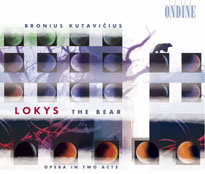"Music that sounds as natural and spontaneous as it is unusual. [...] his music is almost literally magical," - writes Raymond Tuttle in his review of the "Bronius Kutavičius. Last Pagan Rites" CD. Released in 2001, the first Lithuanian project undertaken by the Ondine recording company was linked, hardly by chance, to Bronius Kutavičius, one of Lithuania's most representative composers. Although the Finnish recording company consistently offers the international public lesser known phenomena of contemporary music, this particular choice is aptly characteristic of its ambitious programming policies, for Ondine gives special attention to artists with an individual sound, as well as to quality of interpretation.
Ondine will soon be releasing another Lithuanian CD - "Bronius Kutavičius. Opera
Lokys". "Bronius Kutavičius is one of the few unique and strong personal voices among contemporary composers today. After releasing the "Last Pagan Rites" CD, Ondine is proud to introduce internationally the recording of Kutavičius' new opera
Lokys, where the mesmerizing musical language of the composer and a strong performance create a captivating drama. This is an opera that deserves to be produced in international opera houses," - states Reijo Kiilunen, managing director of Ondine.
Bronius Kutavičius' opera
Lokys (2000), the third of his operas, was beyond a doubt the most eagerly awaited national premiere of the 1999/2000 concert season. It was the first stage production commissioned by the Vilnius Festival, the country's most prestigious event of its kind. Inspiration for the project came from the libretto by USA based Lithuanian writer Aušra Sluckaitė, adapted from Prosper Mérimée's short story entitled
Lokis (
The Bear).
Before the premiere, the composer admitted that he had long had a fantasy of writing a traditional, 19th century-style opera, for full orchestra, choir and ballet. In his new opera, Kutavičius remained indifferent to the interpretation in Mérimée's story of Lithuania as being an exotic land - though it is probable that it was in fact his aura as the creator of 'exotic music', which determined the choice of this composer for the Vilnius Festival project. The opera revolves around the drama of love and fate, the collision of the real and other world. Fairly typical motifs for a romantic opera, they remain the sole link in
Lokys with this particular operatic tradition.
Although the composer claims that he sought also to distance himself from the stereotypes (especially in the vocal sphere) of 20th century operatic music, there is an obvious connection between
Lokys and the operatic traditions of that particular age. Kutavičius' individual idioms intertwine naturally with the musical stylization of the various epochs, while the diversity of musical material as well as rapid changes in stage action are controlled by the principles characteristic of instrumental music: repetitition and transposition typical of minimalism, polyphonic contrasts akin to modernism, and collage techniques and extramusical forms connected with postmodernism.
The CD "Bronius Kutavičius. Opera
Lokys", recorded at the Vilnius Recording Studio in 2001, is being produced as a three-party collaboration between the Lithuanian National Opera and Ballet Theatre, Lithuanian Music Information and Publishing Centre, and Ondine.
© Rūta Goštautienė
Lithuanian Music Link No. 5

